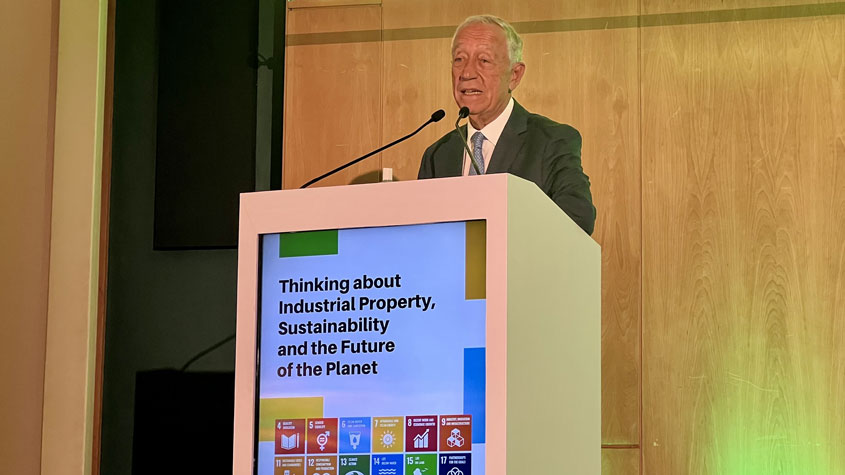Lisbon,
May 30, 2023
PR/2023/902
Intellectual property (IP) tools that underpin the global innovation ecosystem will play a critical role in the achievement of the Sustainable Development Goals (SDGs), the U.N. roadmap for a better and more sustainable future, participants heard at an SDG conference co-organized by WIPO and Portugal.
Hundreds of representatives from 85-plus countries joined the May 29-30, 2023, conference in Lisbon that focused on how intellectual property – such as patents, trademarks, industrial designs and others that promote innovation and economic and social development – can serve as a powerful enabler across all 17 SDGs.
“Our belief is that IP is part of the solution to our common global challenges, and that it can be a powerful catalyst for growth and development, as well as an important tool for translating great ideas into impact that will help us meet the SDGs and leave no one behind,” said WIPO Director General Daren Tang in a welcoming address.
“Already, IP protects those taking risks in areas such as clean-tech and green-tech to create new ideas. It provides a vehicle for lifesaving medicines and breakthrough technologies to get to market. It helps research across the life sciences to create impact. And it is a means for distributing groundbreaking discoveries to places where they are needed the most,” said Mr. Tang, who announced that next year’s World IP Day on April 26, 2024 will focus on the SDGs.
“Innovation and industrial property – from design and legislation, to trademarks and information – are key elements in our joint efforts to generate new ideas and solutions to accelerate progress across all SDGs,” said Amina J. Mohammed, the Deputy Secretary-General of the United Nations and Chair of the United Nations Sustainable Development Group, in an opening address.
Portugal President Marcelo Rebelo de Sousa closed the conference, saying: “Industrial property is a very important tool for sustainable economic development. It allows for the continuation of economic activities that would otherwise disappear. It also creates a strong impetus for innovation in strengthening the legal protection for creativity and inventions, and for enhancing relations between academia and business.”

“A paradigm shift is required regarding industrial property as a key component for sustainability, not only in legal and organizational terms, but also in cultural terms, which includes the articulation of judicial instances. In this regard, we have also established an intellectual property court with three specialized judges, allowing us to specialize and create an atmosphere conducive to the protection of industrial property rights.” said Catarina Sarmento e Castro, Minister of Justice of Portugal.
In his intervention, André Moz Caldas, Secretary of State for the Presidency of the Council of Ministers underlined the key role of IP in the realization of the SDGs, pointing to a recent national report that examined how industrial property plays a critical role in supporting the innovations that drive progress toward the SDGs.
European Patent Office President António Campinos and European Union Intellectual Property Office (EUIPO) Deputy Executive Director Andrea Di Carlo further reinforced the value of IP as a catalyst of growth, development and employment, citing studies in Europe that quantify the impact of effective IP ecosystems on EU economies.
The conference, organized by the Portuguese Institute of Industrial Property (INPI) in collaboration with the World Intellectual Property Organization (WIPO), the European Patent Office (EPO), and the European Union Intellectual Property Institute (EUIPO) was held under the theme ‘Thinking about industrial property, sustainability and the future of the planet’.
Over 500 participants from national and international organizations, including IP Institutes, the EUIPO, the Community of Portuguese Speaking Countries, government officials, private sector representatives, and academia, gathered at the event to discuss the role of IP and innovation as a solution to current global challenges.
There were also roundtable discussions on topics ranging from gender equality and women’s contributions to innovation and IP, green technologies and renewable energies for a sustainable future, adaptation and innovation in traditional industries, the importance of natural and cultural heritage in the economy, governments’ role in promoting the IP system, and the economic and societal impact of IP studies and reports.
Credit:Source link




